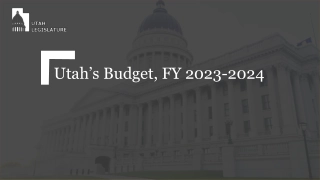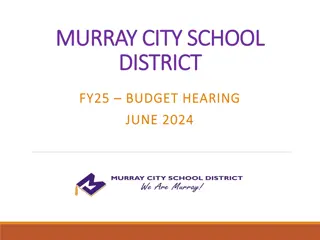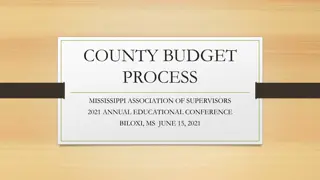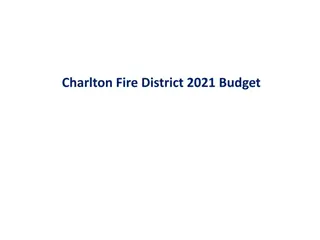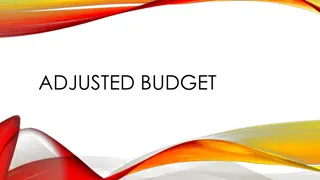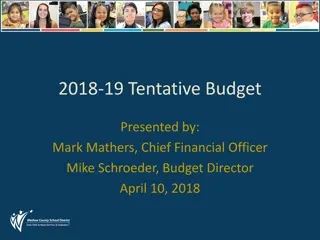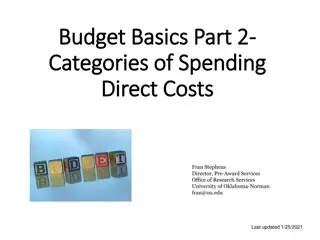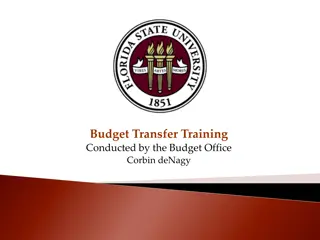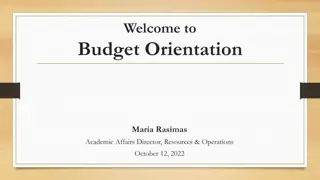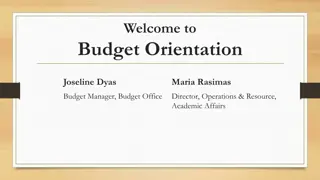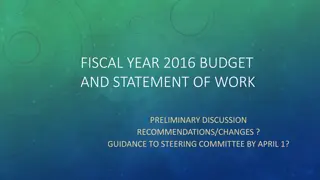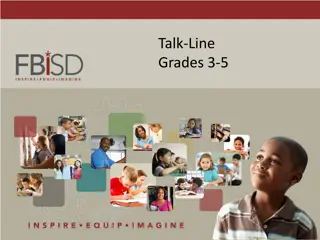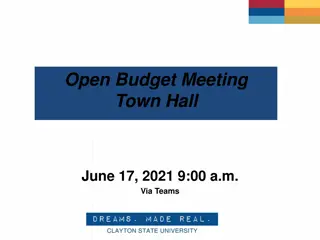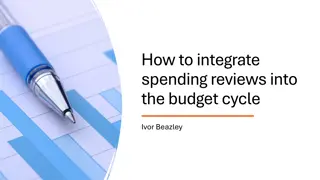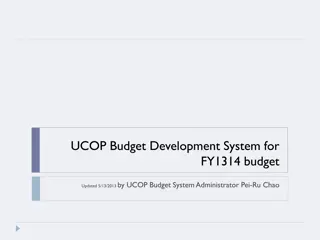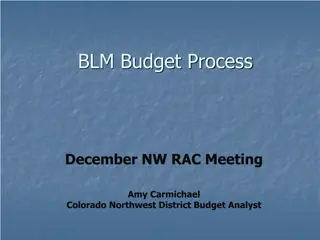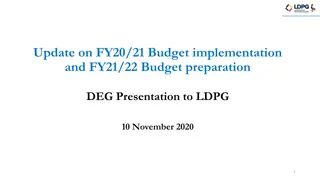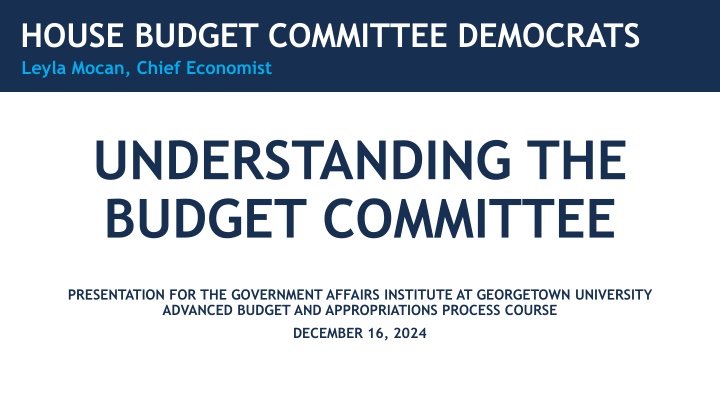
Understanding the House Budget Committee Functions
This presentation highlights the functions and structure of the House Budget Committee, including legislation creation, budget enforcement, hearings, technical assistance, and reports. It covers the process of setting spending thresholds, conducting hearings on various topics, enforcing budget laws, and providing support for writing compliant legislation. The Committee plays a vital role in creating and overseeing the national budget.
Download Presentation

Please find below an Image/Link to download the presentation.
The content on the website is provided AS IS for your information and personal use only. It may not be sold, licensed, or shared on other websites without obtaining consent from the author. If you encounter any issues during the download, it is possible that the publisher has removed the file from their server.
You are allowed to download the files provided on this website for personal or commercial use, subject to the condition that they are used lawfully. All files are the property of their respective owners.
The content on the website is provided AS IS for your information and personal use only. It may not be sold, licensed, or shared on other websites without obtaining consent from the author.
E N D
Presentation Transcript
HOUSE BUDGET COMMITTEE DEMOCRATS Leyla Mocan, Chief Economist UNDERSTANDING THE BUDGET COMMITTEE PRESENTATION FOR THE GOVERNMENT AFFAIRS INSTITUTE AT GEORGETOWN UNIVERSITY ADVANCED BUDGET AND APPROPRIATIONS PROCESS COURSE DECEMBER 16, 2024
AGENDA Budget Committee Structure Budget Process Timeline (aspirational and actual) National Balance Sheet Challenges Ahead Questions
STRUCTURE OF THE BUDGET COMMITTEE Republican Members (21) Chair Republican Staff Analysts Democratic Members (15) Ranking member Numbers Staff Director & Deputy Staff Director Democratic Staff Legal Comms
WHAT DOES THE HOUSE BUDGET COMMITTEE DO? Legislation and creation of the budget Hearings Budget Enforcement Technical assistance Education and Reports
LEGISLATION AND CREATION OF THE BUDGET Why create a budget? Sets targets for spending and revenues, communicates goals and policy objectives, makes economic forecasts, sets budget enforcement levels Committee must pass a budget or a deeming resolution annually to set spending thresholds Deeming resolution ( Deemer ) sets topline discretionary totals but as a single total for appropriations committees to distribute Reconciliation instructions can also get added to budgets. For example, FY21 Budget (American Rescue Plan) and FY22 Budget (Inflation Reduction Act)
HEARINGS Majority sets topics for hearings Because of wide jurisdiction of Budget Committee hearings can cover a range of topics (debt limit, regulations, investments in children, fiscal commissions etc.) Minority generally has less time to prepare, invite witnesses etc.
BUDGET ENFORCEMENT, TECHNICAL ASSISTANCE & REPORTS Budget Enforcement House Budget Committee enforces House rules and budget law Primarily means enforcing PAYGO/CUTGO as legislation comes to Rules Committee Technical Assistance Support for personal office staff and other committees in writing legislation that is compliant with budget law Particularly true when working on a reconciliation bill Reports and Education Committee puts out a series of reports on topics related to Budget and general jurisdiction
TIMELINE OF BUDGET PROCESS Activity Target Date FY24 Budget Dates 1stMonday in February March 9th, 2023 President s Budget Submission Budget Hearings in committees February April One hearing on March 23rd, 2023 Congressional Budget Resolution April 15 Deeming Resolution as part of Fiscal Responsibility Act (6/3/23) Full budget released/marked up September 20. Budget did not go to the floor Annual Appropriations bills marked up and passed May September First full year minibus passed March 9th, 2024 Second full year minibus passed March 23rd, 2024 Government funding runs out/end of FY September 30 1stCR passed September 30 (through 11/17/23) 2nd laddered CR passed November 17th(through 1/19/24 and 2/2/24) 3rd laddered CR passed January 19th(through 3/1/24 and 3/8/24) 4th laddered CR passed March 1 (through 3/8/24 and 3/22/24)
FEDERAL BALANCE SHEET Debt and Deficits
FEDERAL BALANCE SHEET Revenues and Outlays Outlays have been outpacing revenues for last several decades Bumps in outlays during times of crisis, typically inverse pattern with revenues COVID crisis a major exception
FEDERAL BALANCE SHEET Revenues Individual income tax makes up bulk of revenue collection (includes capital gains taxes) Corporate income share has been falling since the 1960s Payroll tax is the major revenue source for the Social Security Trust Fund
FEDERAL BALANCE SHEET Spending Mandatory spending makes up a larger portion of spending than discretionary spending. Discretionary = funded by annual appropriations Mandatory = Not funded by appropriations but determined by eligibility criteria
FEDERAL BALANCE SHEET Spending Mandatory spending is main driver of increased spending. This is due to aging of the population and thus greater reliance on the Social Security and Medicare Trust Funds Increased interest rates is projected to push up net interest costs
CHALLENGES AHEAD Maintaining solvency of Trust Funds while keeping commitments to seniors Keeping the U.S. on a sustainable fiscal path while making sure we have resources to face challenges ahead (child care needs, climate crisis etc.) Expiration of the 2017 Tax Cuts and Jobs Act at the end of 2025 Debt limit expiration on January 1, 2025
THANK YOU! Questions?
APPENDIX Interest Rates
APPENDIX Demographics
TAX CUTS AND JOBS ACT EXPIRATION The law was passed as part of reconciliation, so major provisions expiring at the end of 2025 Note some parts of the law, like the corporate tax cut, are permanent Of the individual provisions, major expiring pieces are individual income tax rates, expanded child tax credit, SALT deduction cap, increase in standard deduction, mortgage interest deduction cap and others. CBO has estimated that extending the expirations as written will cost $4.6 trillion over the decade.

